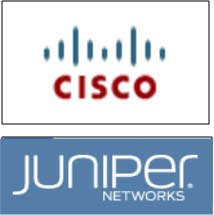
Today, for business, satisfying and attracting customers is indispensable. That’s because customer requires better service and multifunctional products. Yet to meet customer’s need poses challenges. And the competition between counterparts is fierce. Because my work is related to Cisco, so I’d like to take Cisco as an example to analyze Cisco and its competitor Juniper.

Cisco
Cisco was founded in 1984 and quickly became dominant. In its acquisitions, it focused on integrating marketing functions, not integrating the technology that it acquired. Cisco’s approach is based on multiple hardware boxes. Each hardware box runs proprietary software, and a different chip. For customers that has created huge complexity.
Juniper
Juniper founded in 1996, the first serious challenge to Cisco. Jim Duffy notes in Network World that with the growing importance of the Internet, venture capitalists and unhappy Cisco customers invested a start-up in order to build a better mousetrap, specifically for service providers. Juniper’s first year was nurtured with early investments from the AT&T, Ericsson, Lucent, Nortel, Siemens/New bridge Networks, 3Com and UUNET. IBM agreed to develop custom chips for Juniper’s Internet routers.
Network Router Showdown: Cisco vs. Juniper
By TechNewsWorld.com
Cisco does have competitors, especially in sectors that crave speed. For example, when service providers like MCI/WorldCom, Sprint or AT&T update their infrastructure, they increasingly are choosing to buy from Cisco rival Juniper Networks (Nasdaq: JNPR). In fact, Liscom said, 23 of the 25 major service providers now use Juniper routers.
Juniper routers increasingly are being used in the infrastructures of governments’ and financial institutions’ intranets. According to her, Juniper boxes are purpose-built to handle new services, such as VPNs (Virtual Private Networks) that are tunneled over existing IP networks.
By Tutorialsweb.com
Operationally, both Cisco and Juniper routers are based on different hardware and software concepts. Cisco routers use Cisco IOS and Juniper routers use JUNOS.
Applications wise, both Cisco and Juniper cater to similar market segments. However, both have some advantages in certain areas compared to the other. Cisco, being the first to enter the market, has better market penetration. One of the strong areas of Cisco is the low-end router market including remote-office, and branch-office connectivity solutions. Both Cisco and Juniper provide high-end router solutions that offer gigabit transfers and advanced security routing solutions.
Cisco vs. Juniper, Tragedy or Comedy
From the analysis above we know that in fact both Cisco and Juniper have its own advantages in the market. The research and targeted consumer are little different, they share different markets. No winner, just comedy.
Notes: Cisco is famous for designing and manufacturing Cisco routers, Cisco switch, and firewall security for enterprises, offering professional and best networking solutions for network users. More about Cisco and Cisco network equipment you can go to Cisco.com.
More Cisco News and Reviews you can visit: https://blog.router-switch.com/


